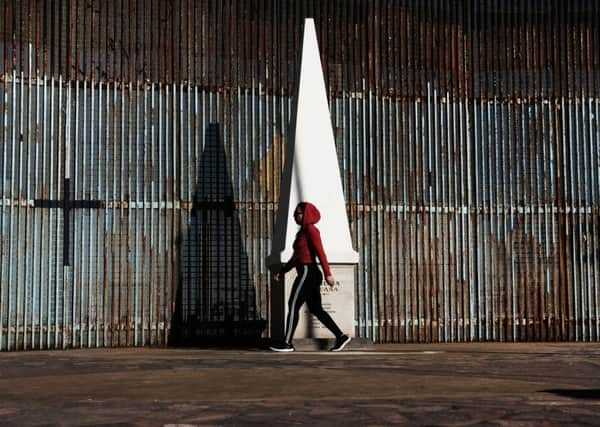Book review: The Wall, by John Lanchester


The Wall is set, initially, on the “National Coastal Defence Structure”. Britain has hemmed itself in behind a concrete barricade, ever since “The Change”, an ecological catastrophe of some sort. The young have a kind of National Service to patrol the Wall against incursions from “The Others”. Not everyone has to do it; the richest in society can somehow elude the compulsory service. If Others do get over the Wall, the punishments are severe on the “Defenders”. But if they do get over, some Others are given the dubious privilege of becoming “Help”, a kind of indentured slavery.
This cut-off Britain is a place where turnips are the staple diet, where you are micro-chipped to determine how free your freedoms are, where the rain is persistent and there is a simmering resentment from the younger generation, who have to fix the mess, towards the older generation, who created it.
Advertisement
Hide AdAdvertisement
Hide AdThe point-of-view character is Kavanagh, a bespectacled and ambitious young man starting his two-year stint on the Wall. It is an easy way to do the “info-dump” on the reader about what kind of world we are reading about and also to lend a certain empathy about the entire situation. He is, at first, as astray as we are. As the novel progresses, more dissociation occurs between narrator and reader. His presumptions might not be your presumptions. There are some beautifully off-key notes, when Kavanagh’s world-view clashes with that of the reader, especially about violence.
The opening of the novel is a masterclass in making the dull interesting. Life patrolling the Wall is a combination of not wanting any incident to occur and desperately wanting at least something to happen, to break the interminable tedium. As Kavanagh muses: “We were cold but the Others were colder. We were bored and tired and uncomfortable and anxious, they were angry and frightened and exhausted and desperate.” There are “plotty” points – of course, we realise that eventually combat will be a reality and not a drill; there are various entanglements with Kavanagh’s co-Defenders and with the hierarchy, particularly the enigmatic Captain; and moments of self-doubt and paranoia. In a way, I would have preferred the whole novel to be just about the relentless nature of duty.
It is difficult to review this book in that there is a major change two-thirds of the way through. It had already dallied with being a kind of thriller, but the final section took me by surprise, in a good way. I suppose the best way to explain it without giving away any spoilers is that the earlier sections are rather too obviously allegorical (walls, migrants, surveillance, a kind of black-and-white television country). In the later parts, the allegory is less easy to decipher or decode. It becomes almost mystical and is left beautifully unresolved.
There are flourishes that seem too much like flourishes: typographical poems about the unremitting nature of the Wall, all iterations on “concrete water wind sky” that are effective but seem out of kilter with the character. There are some inspired parts in these depictions of the day-to-day: “Defenders have a saying, ‘The Wall has no accent’… like most sayings about most things, this is partly true, partly not.” The “is and is not” is Kavanagh’s rhetorical trope throughout the novel, and it works well.
Dystopian fictions have a peculiar double-tug. There is the crushing mundanity of Orwell’s 1984, or Huxley’s Brave New World, Zamyatin’s We, or even Dave Eggers’ The Circle, and at the same time a kind of thrill of imagining how horrible things might be. They may be warnings, but as often as not they fall in love with their own fantasies of despair. The Wall is somewhat similar. Having built a world, it is difficult to break it. At least – on TV at least – George RR Martin’s Wall crumbled.
At the end of the book – given Lanchester’s impressive ability to switch genres – I wondered if there might not be a sequel. The relevance to contemporary politics might be a little over-played, but the characters seem robust enough to earn them another outing.
At one point, the mother of the love interest character for Kavanagh wants to paint his “spirit animal” and determines it is a goat. She thinks that is because he is nimble, but he is also a scapegoat and has a propensity to bleat. Lanchester is certainly nimble, but also, like the goat, he can be daemonic.
The Wall, by John Lanchester, Faber & Faber, £14.99